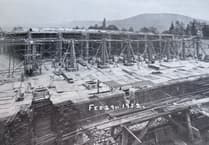HOMEOWNERS could be discouraged from paving over gardens if they are aware doing so could decrease the value of their home, it has been suggested.
Monmouthshire County Council officials have been urged to produce an advice leaflet for residents on simple steps they can take to reduce flooding risks including avoiding completely concreting over gardens to create parking areas.
Councillor Emma Bryn said “only 27 per cent of Wales front gardens now consist solely of plants and flowers” and said green gardens as well as preventing water run-off reaching roads and pavements “help reduce reflected heat that you get from hardstanding” on days such as those during the heatwave.
The independent councillor was speaking as Monmouthshire County Council’s place scrutiny committee discussed its local flood risk management strategy.
The Wyesham councillor acknowledged recent planning regulations around SUDS, or sustainable urban drainage, now controls run-off from new developments but said she would like to have seen more practical advice included and suggested the council produce a guide.
She said: “It could illustrate what they can do to mitigate flood risk such as install parking but without removing every flower or bush. Perhaps if it says average house prices can drop if people completely pave over their gardens it could show being more green helps their pockets as well as the environment.”
House prices in Abergavenny have an overall average of £341,385 over the last year according to Rightmove with detatched properties selling for an average price of £462,940 , semi-detached properties for an average of £301,328 and terraced properties fetching £253,164.
Shirenewton Conservative Louise Brown said she also thought the strategy should give more practical advice: “Something as simple as a tractor going through a flooded area can divert water to housing or shops. There doesn’t seem to be anything practical like that.”
She added: “It seems quite a theoretical strategy as opposed to practical.”
Council flood risk manager Ross Price said the strategy is a “high level” document that sits above the action plans produced for the county’s nine flood risk areas that are based on river catchments and that do contain localised information.
The council is the lead local flood authority and its responsibilities are for risks from surface water run-off, groundwater and ordinary watercourses which are smaller ones and not the designated main rivers.
Responsibility for main rivers, the Gwent Levels and reservoirs rests with Natural Resources Wales while both it and the council have responsibilities for coastal and tidal fooding. Welsh Water is responsible for sewers.
The strategy covers the council’s responsibilities and will be subject to a public consultation which will also include drop in events in Abergavenny, Usk, Monmouth, Chepstow and Caldicot.
Dewstow Labour councillor Tony Easson said the plan to consult for six weeks from August 1 to September 12 was too short and at the wrong time of the year.
He said: “August is holiday time and a bad time to consult.”
Chief officer Craig O’Connor said six weeks meets the statutory period but he said it could be extended to eight weeks.





Comments
This article has no comments yet. Be the first to leave a comment.